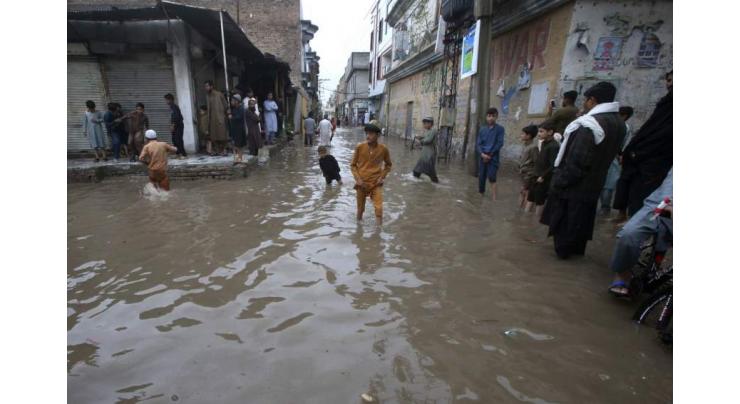
- Home
- Pakistan
- News
- SHRC launches research paper on flood rehabilitation, warns of heavy rains during 2024
SHRC Launches Research Paper On Flood Rehabilitation, Warns Of Heavy Rains During 2024
Muhammad Irfan Published June 08, 2024 | 09:32 PM

Sindh Human Rights Commission (SHRC) has launched a research paper titled “Rights of People and State of Flood Rehabilitation in Sindh" in program held here at a local hotel
KARACHI, (UrduPoint / Pakistan Point News - 8th Jun, 2024) Sindh Human Rights Commission (SHRC) has launched a research paper titled “Rights of People and State of Flood Rehabilitation in Sindh" in program held here at a local hotel.
Speakers emphasized the urgent need for precautionary measures ahead of this year's monsoon season as the Meteorological Office predicted that Southern Pakistan may receive heavy rains comparable to the 2022 deluge, which caused devastating floods in Sindh, Balochistan and Southern Punjab.
Sindh Minister for Rehabilitation Makhdoom Mehboob Zaman, the event's chief guest, assured that the provincial government was making every effort to rehabilitate those affected by the 2022 floods. He noted that the Sindh government is constructing millions of houses in flood-affected areas, affirming, “Sindh government will not leave people alone.”
Chairman of the Sindh Human Rights Commission, Iqbal Detho stated that according to the UN and the Constitution of Pakistan, flood affectees have the fundamental right to rehabilitation and must be provided with basic facilities like education, health and safe drinking water.
Following the 2022 floods, SHRC members visited various affected districts and initiated a comprehensive study focusing on the floods in the province. Detho noted that the rural areas of Sindh were severely impacted by the 2022 floods. He emphasized SHRC’s role as a bridge between civil society and the government, committing to protecting the rights of vulnerable members of society.
Researcher Naseer Memon highlighted the extensive impact of the 2022 floods, which affected 24 districts.
The research focused on the human rights of vulnerable communities including persons with disabilities, minorities, women and children, and covered three key districts i.
e Khairpur, Dadu and Mirpurkhas to provide a comprehensive cross-section of the affected areas and populations. The study involved direct communication with local communities and government officials to gather firsthand insights.
"People were actively engaged in the process, and their inputs have been incorporated into our recommendations," Memon said. The study found that the extraordinary rains and subsequent disasters disproportionately affected women and vulnerable sections of society, who received no special consideration in the relief efforts.
Many people lacked basic shelter for several days after the flood and drinking water sources remained heavily polluted, research paper stated.
Alarmingly, there is no comprehensive data available on the health impacts of the floods, though there were abnormally high cases of malaria and other waterborne diseases reported. The education infrastructure also suffered significantly, with 35% of girls' schools damaged, and only half of these schools have been repaired, mostly during election periods.
While 500,000 houses have been constructed, marking a significant improvement with many being 'Paka" houses, those displaced at the time of the floods often missed out on compensation. Moreover, one and a half years later, floodwaters still stand in parts of Khairpur district, he pointed out.
Memon underscored the urgent need for District Disaster Management Authorities (DDMAs) to become more active, noting significant gaps in their current operations.
Related Topics
Recent Stories

Cricket: England v West Indies 3rd Test scoreboard

Finance minister briefs Chinese officials on reform agenda, engagement with IMF

Finland says Russian vessel violated its territorial waters

Olympic opening ceremony under way on River Seine

West Indies' treble strike rocks England in third Test

Ukraine court orders detention of suspect in murder of nationalist ex-MP

Long queues, ticketing problems ahead of Paris opening ceremony

Rana Sanaullah Khan joins Paris 2024 Olympics inauguration reception

Glowing tributes mark 69th birthday of President Zardari at Governor's House

Players unaware of spying scandal as Canada Olympic coach sent home: official

Naqvi hails Pak women cricketers for going down fighting against SL

'Sabotage' on French rail network before Olympics: What we know
More Stories From Pakistan
-
NDMA Advisory: More Monsoon Rains-wind, Thundershowers from July 28-31
6 hours ago -
Armed Forces, tri services chiefs pay homage to Captain Sarwar Shaheed
6 hours ago -
Agriculture dept inks agreement with Bakhabar Kissan
7 hours ago -

Rana Sanaullah Khan joins Paris 2024 Olympics inauguration reception
7 hours ago -

Glowing tributes mark 69th birthday of President Zardari at Governor's House
7 hours ago -

Balochistan CM announce depoliticizing of police, Levies force
7 hours ago
-

PTI creating unrest, halting economic progress in country: MNA
7 hours ago -

ISSI holds webinar on “Elections in Iran : Regional and International Insights”
7 hours ago -

ECP defers written test for seats of election officers
7 hours ago -

PN assists in firefighting, evacuation efforts for stranded civilians of Kashif Centre fire incident
7 hours ago -

Women's rights protection is govt's top priority. Hina Parvez Butt
7 hours ago -

"We stand in solidarity with Azma Bokhari”: Secretary Women’s Parliamentary Caucus
7 hours ago








